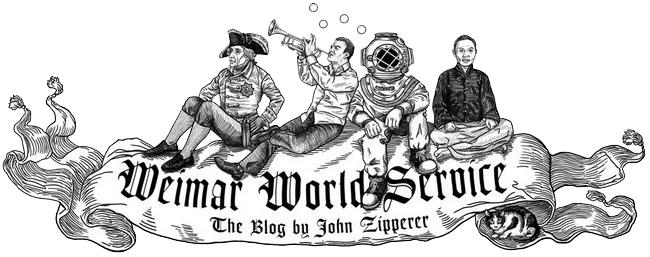Starlog #137 has both productions: The TV series as well as writer a report on the controversial 1938 radio play. That mix of the brand new and the classic was always one of the things Starlog did best.
Starlog #137
76 pages (including covers)
Cover price: $3.50
Classified ad of the month: "FREE A new mailing list is being formed for distribution to hundreds of companies that give away free items in the mail: Free samples/Promotional items/Sci-Fi/Horror/Fantasy/Subscriptions! Anything & Everything Free. If you would like to be on this list, send $2 processing fee to ..." It's sort of the genius ad of the year: Have someone pay to be placed on a mailing list.
The rundown: In his From the Bridge column, publisher Kerry O'Quinn begins a multi-part editorial about how to find out what really interests you in life; Communications letters include a number of letters on the situation of BBC's Doctor Who program, which at this time was undergoing a rather tumultuous period in its long life, plus readers chime in with thoughts about Beauty and the Beast, the magazine's recent articles on the bodies and voices behind Star Wars' Darth Vader, the TV airing of David Lynch's Dune, and more; in the Medialog section, there's Kim Howard Johnson on a rather bizarre rumor that John Cleese is in the running to play Doctor Who (Cleese muses, "People reading newspapers often think there's no smoke without fire – my experience is that in many cases, there is"), Ian Spelling on a young Kiefer Sutherland (at this time, he was known mainly for Stand By Me and The Lost Boys), and David McDonnell's roundup of genre headlines (such as the news that the next James Cameron film is going to be called The Abyss – not that you asked, but in my opinion, it's the best Cameron film).
Adam Pirani previews director Neil Jordan's film High Spirits (starring a much-younger Liam Neeson, along with Steve Guttenberg, Daryl Hannah, and Peter O'Toole); Diana Whitaker Jackson interviews writer Jean Lorrah, author of The Vulcan Academy Murders, Empress Unborn, and more; Edward Gross profiles director Richard Colla about his tours of duty on Battlestar Galactica, The Questar Tapes, Star Trek: The Next Generation, and other shows; Theorist-in-Chief Michael J. Wolff turns his pen (keyboard?) to tackling the meanings of The Blob (the first time I wrote that sentence, I misspelled it as "The Blog," which would be about a different beast that takes over the world); because Cocoon was a success, 20th Century Fox decided the world needed a follow up, and Ian Spelling was dispatched to report on Cocoon: The Return.
Glen E. Swanson explains the making and the resulting controversy of Orson Welles' 1938 radio version of War of the Worlds, with a sidebar by Daniel Dickholtz on a new production of the story for National Public Radio; meanwhile, Peter Bloch-Hansen gets the behind-the-scenes story on the making of the syndicated TV series; in the Fan Network pages, there are answers to reader queries (such as, "Having seen The Boy Who Could Fly on cable, I have fallen for Lucy Deakins. Is she sticking with acting or has she gone on to be a marine biologist as she stated in the interview in Starlog #111?") and some short news bits on a Twin Cities Doctor Who convention and a James Bond art competition; producer Frank Marshall is interviewed by Edward Gross and David McDonnell, who get him to discuss Who Framed Roger Rabbit, the new Indy Jones film (Indiana Jones and the Last Crusade), and more; Michael Mallory interviews stuntman Tom Steele; Desire Gonzales profiles the actor who played the Next Generation's Traveler character, Eric Menyuk; Peter Bloch-Hansen talks with screenwriters Brent Maddock and Steve Wilson about their creation, Short Circuit and its sequel, and they tell him "We've discovered that writers are basically powerless" in Hollywood; in an extra-lengthy Videolog column, David Hutchison gives background on Disney's The Three Caballeros and Cinderella; Carr D'Angelo interviews AlienNation director Graham Baker; and editor David McDonnell wraps it all up in his Liner Notes by listing all kinds of magazines not published by his company to which you should consider subscribing. I'm sure his bosses loved that column.
"Graham Baker is unique in Hollywood: He is the first director of a science-fiction film who is actually a visitor from space. (He's lying. While Baker is the director of AlienNation, a tale of extraterrestrial immigrants in Los Angeles, he is originally from England.) On his home planet, Baker was a prominent rocket scientist whose visionary ideas about space travel inspired a generation. (Actually, Baker spent 15 years in advertising as an award-winning commercials director before helming his first feature.) Prior to AlienNation, Baker had taken an extended vacation on Mars where he is an honorary colonial governor. (Not true. Before filming began, Baker kept busy directing the infamous Joe Isuzu ads that immediately became a pop culture staple – but you may have figured that out already.)
–Carr D'Angelo, writer, "Pride & Prejudice"To read previous Starlog issue descriptions, click on "Starlog Internet Archive Project" in the keywords below or visit the StarlogProject's permanent home.




No comments:
Post a Comment